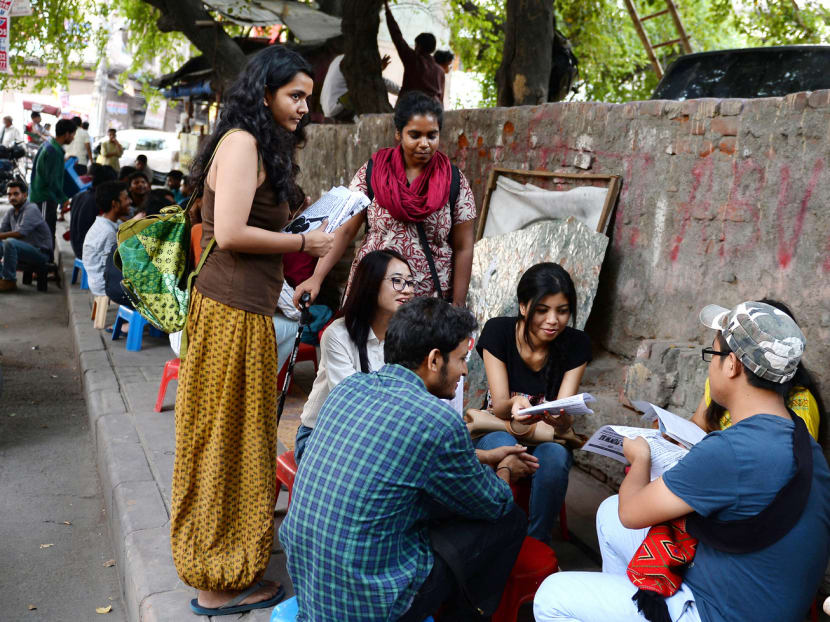India’s female students rebel against varsity curfews
NEW DELHI — Twenty-year-old zoology student Rani Choudhary left her family home in Bihar for the bright lights and freedom of the Indian capital.

Activists Shambhawi Vikkam (left) and Shriya Subhashini (middle) speaking to fellow students outside Delhi University about the Pinjra Tod campaign, protesting how universities force women to return to their dorms early. PHOTO: AFP
NEW DELHI — Twenty-year-old zoology student Rani Choudhary left her family home in Bihar for the bright lights and freedom of the Indian capital.
But like most female students in New Delhi, she is barred from leaving her dorm at night except with the express permission of her father, thanks to a curfew designed to safeguard her in the city dubbed “India’s rape capital”.
Wary of the city’s disturbing reputation for sexual violence, universities force women to return to their dorms as early as 7pm — while their male counterparts can stay out much later.
With the Pinjra Tod (“Break the Cage”) campaign, launched in August, female students are fighting back against what they say is outright discrimination.
“You are supposed to go and be back at 7pm, at 7.30pm and 8pm, while your friends studying with you, boys, the men in your class, they can (go out at) night and they can enter the hostel by 10 or 12,” said a movement ringleader, Shambhawi Vikkam.
“And even if they have rules and regulations it doesn’t really apply so strictly,” said the 23-year-old arts student at the University of Delhi.
At a night-time protest in the capital, about a hundred young female students gathered outside a subway station singing as they held up placards proclaiming “No more curbing late nights”.
Other slogans brazenly mocked the rules, declaring “I got a feeling that tonight’s gonna be a good night”.
Several protesters wore dresses or skirts, defying warnings from parents or the university administration about night-time dangers in the city.
But for many female Indian students, the desire for independence also conflicts with family attitudes within the deeply patriarchal country.
Ms Choudhary is theoretically allowed out until 11pm four times a month, and is permitted to spend five nights away from her dorm — but says it is impossible in reality. “I need the permission of my parents and I know that my father will never allow me to go out at 10pm,” she said.
Safety is the main justification for the curfews put forward by the heads of university residences. The fatal gang rape of a medical student in Delhi in December 2012 left a profound mark on the capital, and violence against women has not declined since.
A spokesman from Jamia Millia Islamia University in Delhi said a plan to reform the curfew was “under consideration”. “(Safety) measures are the need of the hour. We have to be very mindful, there are global concerns over safety of women in India,” said Dr Mukesh Ranjan.
Yet students argue that confining them inside is not the answer. “If you really want to make a city safe for a woman ... you have to make the city accessible to her, you have to have more women out in the streets,” said Ms Choudhary. “So, that is the solution, not locking people inside.”
The students are willing to let their dorms set a time to return, as long as they are not deprived of a social life. “One thing we are demanding is ... let hostel curfews be at least half an hour after the library closes or the last metro, so you’re not locking women out of the public space they have the right to access,” said Ms Shriya Subhashini, 25, a law student at the University of North Delhi.
Ms Ira Trivedi, author of books on love and sexuality in India, said that as long as the gap between women’s aspirations and the rules imposed on them remains wide, protests in cities will grow.
“I think young women are developing the courage, confidence and know how — and technology and the Internet help a lot — to stand up for themselves and battle such conventions,” said Ms Trivedi.
“They are beginning to realise how archaic these concepts really are.” AFP





